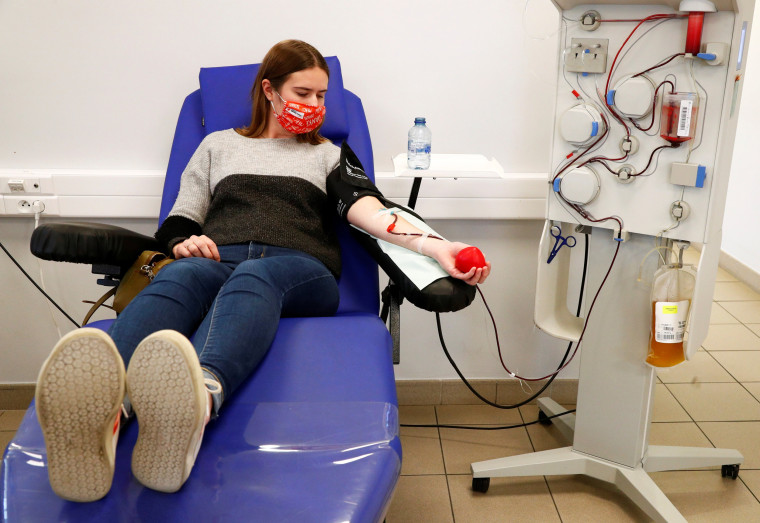Coronavirus antibodies may provide protection against reinfections even if they wane over time, according to experts, who say people shouldn’t be alarmed by recent studies that had seemingly contradictory results.
Antibodies and other immune responses have been a major focus of coronavirus research because there are important implications for how long people could be protected before a vaccine is available. If antibodies confer immunity that is long-lasting, for example, people who have been infected may be protected until there is a viable vaccine. But waning antibodies could mean that Covid-19 survivors may be at risk of reinfection.
A pair of studies released this week raised some confusion because of their divergent findings. One paper published in the journal Science, led by scientists in New York, found that Covid-19 antibodies developed by the immune system lingered at stable levels for around five months. But two days earlier, a preprint study that has yet to be peer-reviewed, found that among hundreds of thousands of participants across England, antibody levels declined rapidly, falling more than 26 percent over a three-month period.
Most experts agree that drops in antibody levels over time are expected, and that these declines are not altogether concerning.
“If you think about basic immunology, you should have an antibody response initially and then that antibody response should go away,” said Ritesh Tandon, an associate professor of microbiology and immunology at the University of Mississippi Medical Center, who was not involved with either study. “Antibodies are dynamic — they are not made one time and stay in the blood.”
Dr. Anthony Fauci, the nation’s top infectious disease expert, echoed that sentiment, adding that declining antibody levels do not necessarily translate into a lack of immunity.
“Just because the level of antibodies diminish, that doesn’t mean you lose protection,” he said Thursday in a press briefing from the National Institutes of Health.
In the recent study published in Science, researchers at the Icahn School of Medicine at Mount Sinai used a database of immune responses from 30,000 New Yorkers who tested positive for the coronavirus between March and October and monitored 121 volunteers over time.
The researchers found that antibody responses peaked roughly two to three months after infection. And in 90 percent of the people who recovered, antibody levels subsequently dropped but remained stable for around five months, said Dr. Ania Wajnberg, an associate professor of medicine at the Icahn School of Medicine and a co-author of the Mount Sinai study.
A “majority of patients have a relatively robust response and so far, that is persisting over time,” she said.
In the U.K. study, scientists at Imperial College London found that antibody prevalence in the British participants fell from 6 percent at roughly the end of June to 4.4 percent in September. And using at-home tests that were distributed to more than 365,000 people, the researchers observed a more than 26 percent decline in antibody levels over three months.
But there were limitations with the British study. Although the study had hundreds of thousands of participants, the researchers did not follow the same people over time. The study also did not precisely measure antibody levels.
“The sensitivity between the two tests is a major difference,” said Alan Wu, a professor of laboratory medicine at the University of California, San Francisco, who was not involved with either study. “It’s a little bit apples and oranges, in the sense that the studies are not done in the same way.”
But despite the seemingly divergent results from the two studies, they can both be true, according to Dr. Arturo Casadevall, chair of the molecular microbiology and immunology department at the Johns Hopkins Bloomberg School of Public Health. It’s not unreasonable — or particularly alarming — if antibody levels decline rapidly after a person recovers and then persist for some time at a much lower level, he said.
“We know that other coronaviruses tend to elicit immunity that is not long-lasting,” Casadevall said. “The question is: How much antibodies do you need to prevent reinfection? It may be that you need very little.”
Still, antibodies are not the only weapons in the immune system’s arsenal. There are cellular immune responses that could recognize a virus and provide some protective immunity. People who have been infected with a virus also typically produce “memory cells” that can recall certain pathogens and quickly mobilize a defense against reinfection.
“Antibody immunity is only one part of immunity,” Casadevall said. “If you have immunological memory, it means that if you confront the coronavirus again, your body doesn’t need two weeks to figure out how to react. That memory could kick in right away.”
There is no easy way to detect memory cells and cellular immune responses in recovered patients, but it is an active area of research, according to Tandon. And so far, immune responses to the coronavirus are more or less in line with other known coronaviruses, he added.
“It does play by the rules of immunology — it’s not an alien virus that we seem to know nothing about,” Tandon said. “I haven’t seen anything that makes me think this is a virus that is very different from anything we’ve seen before.”

